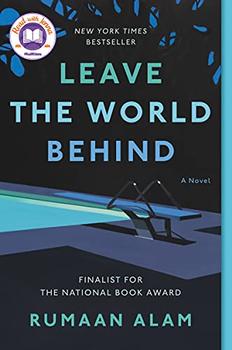Summary | Excerpt | Reviews | Beyond the book | Read-Alikes | Genres & Themes | Author Bio

Amanda, Clay and their two teenage children have rented a remote vacation home in Long Island to escape the stresses of daily life. In the dead of night, the spell is broken by a knock at the door. It heralds the arrival of Ruth and G.H., an older Black couple who claim to own the property. They explain that New York has been hit by a blackout and that something strange is going on in the city, so they've returned to Long Island seeking shelter. Amanda and Clay warily let them in, though they have no WiFi, phone or TV signal to corroborate the couple's story. As events take ever stranger turns, they will all be pushed to consider the fragile nature of safety and togetherness.
The opening chapters establish Amanda, Clay and their children as a typical middle-class, white American family, as eager to maintain their carefully curated image as they are prone to casual racism. It's clear they are not bad people, and we sympathize with them later in the narrative, but it does well to highlight just how ingrained society's prejudices surrounding race and class have become.
The arrival of Ruth and G.H. forces them to confront these biases within themselves. Amanda and Clay's initial play for dominance and mistrust of the homeowners is rooted in harmful stereotypes and their misguided belief that a Black couple could never afford to own such a beautiful home. With the threat of the outside world closing in, however, what once seemed like fundamental differences soon fade into insignificance. Here, author Rumaan Alam shows that the need for unity in times of crisis can allow our shared humanity to triumph over any disparity in our supposed social standing.
Perfectly paced and punctuated by striking imagery throughout, Alam creates a singular atmosphere that is as discomfiting as the plot itself. Tense and anxiety-inducing, even the quietest moments simmer with an undercurrent of threat. Third-person omniscient narration shifts among the principal characters — with a greater focus on Amanda and Clay — and also offers the reader occasional glimpses of the chaos unfolding back in the city. These snippets are never enough to confirm precisely what is going on, but they serve to ramp up the stakes by emphasizing just how isolated and in the dark the protagonists are.
By positioning his characters on the periphery of disaster in this way, Alam is able to tap into the paranoia, denial, speculation and even the enduring boredom of domesticity that remain when society is on the brink of crumbling. It also makes clear that the point of the novel is not to try and understand "what's going on," but rather to observe the various ways each character responds to fear itself. Be it nuclear, extra-terrestrial or otherwise, the threat is not important; what matters is seeing which bonds are forged and which are broken, what differences they are willing to overcome, and just how brave they are prepared to be when those they love — and those they do not know — are in danger.
One of the book's most successful themes is its look at our reliance on connectivity. In an age when unlimited information is constantly at our fingertips, lacking control and being truly cut off has arguably become one of humanity's greatest fears. Clay and Amanda — representative of America's everyman and everywoman — romanticize the notion of "unplugging" for the week, but when the thin veil of safety is broken, little causes more panic than their inability to contact civilization to find out what awaits beyond the trees that surround their temporary sanctuary.
If there is one element likely to divide readers, it is the novel's abrupt and ambiguous ending. Though some might be frustrated by a lack of closure, this deliberate creative decision perfectly mirrors the characters' situation and the book's core themes, leaving us pained by our own lack of information.
With its pertinent social commentary and many possible interpretations, Leave the World Behind is precisely the kind of novel that is difficult to discuss without dissecting its plot (and thus resorting to spoilers). However, it begs to be debated, making it an ideal book club pick you'll be urging everyone to read. By tapping into the heightened stress of modern life — the reality of constantly existing on the edge of disaster, and being forced to question how you would respond should society be under threat — the novel is prescient and undeniably relevant to the present moment.
![]() This review was originally published in The BookBrowse Review in October 2020, and has been updated for the
January 2022 edition.
Click here to go to this issue.
This review was originally published in The BookBrowse Review in October 2020, and has been updated for the
January 2022 edition.
Click here to go to this issue.

If you liked Leave the World Behind, try these:

by Ruby Todd
Published 2025
A young widow grapples with the arrival of a once-in-a-lifetime comet and its tumultuous consequences, in a debut novel that blends mystery, astronomy, and romance, perfect for fans of Emma Cline's The Girls and Ottessa Moshfegh's Death in Her Hands.

by Paul Lynch
Published 2024
Exhilarating, terrifying and surprisingly intimate, Prophet Song offers a shocking vision of a country at war and a deeply human portrait of a mother's fight to hold her family together.
Your guide toexceptional books
BookBrowse seeks out and recommends the best in contemporary fiction and nonfiction—books that not only engage and entertain but also deepen our understanding of ourselves and the world around us.